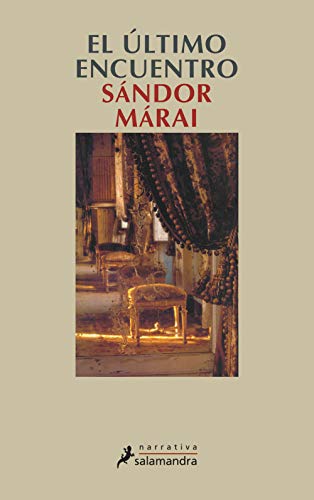The literary glory of the Hungarian Imre Kertész, who won the Nobel Prize in 2002, has its roots in the literary legacy of his compatriot Sándor Márai.
Only in the case of Márai, his coincidence with who would be one of the most complete European narrators and chroniclers of the first half of the XNUMXth century, Thomas Mann, largely overshadowed him as a speaker of that realism made into a novel, and also meditation and reflection in a very extensive work of fiction and non-fiction.
Still, Márai also emptied himself into a considerable bibliography. Because the job of writing is not about competing, but about drive, the need to express, share, elucubrate in fiction and pose in essays. Without forgetting in the case of Márai forays into poetry and theater.
And as always, in variety is taste and in complementarity, richness. To discover Márai's novels is to enter a new setting in which to discover fascinating characters located in these extremely interesting life approaches.
Because there is something in Márai of always looking for the dilemmas, the vision of life as an adventure from the choice. A starting point from that very human free will that can make a particular existence and the various contingencies of the world, a journey towards the final decipherment of the soul.
Top 3 recommended novels by Sándor Márai
The last meeting
There are places, spaces, places with imperishable echoes for the visitor who returns precisely like this, as a visitor towards memories. The matter has something of melancholic poetry, of an evocation of the past almost audible like an echo, practically revivable from a characteristic smell ...
The question is knowing how to compose, with that intoxicating magic of nostalgia, a story as magnetic as this one. Because the reunion of the protagonists of this plot has much of that magnetism of two poles separated by circumstances but back by chance. People are largely children of the magnetism that governs our planet, of essential forces such as gravity or inertia. The same happens with that so-called chemistry between people at the intangible level of the soul.
And also fatality has its centripetal force when the memory of a love crosses the lives of two men who wanted to have it exclusively. They were other days in the old castle. The music sounded every evening as a celebration of life and prosperity. Now there is no music, not at least as a real sound but perhaps as an echo between the thick walls
Only this time everything sounds with a more dire tone, as if announcing that the pending debt between the man who left very far from there and the one who stayed to inhabit that suspended life, rocked in a time that composed A single destiny about to be sentenced, but in the meantime, Sándor Márai will give us a good account of everything. About the motivations of each of its protagonists and the future of a world that wanted to turn off any music forever.
The righteous woman
I have always thought that a great writer is one who is able to abound in a resource without overexploiting it. If, in addition, the opposite is achieved, of appearing lightness by continually pulling the same thing, we are facing a genius.
The soliloquy is something that in theater looks very good because it comes. The actor's voice reaches us with its echo and transmits all its depth to us with each gesture and movement. Another thing is to read a novel where the monologue is the substance of everything. But of course, Márai does as well between scripts as between novels. And the result in this case is a manifest perfect conjugation.
A love triangle is, possibly, the argument of arguments for a multitude of approaches about betrayal, heartbreak, revenge ... But this time we visit the souls of the three protagonists, because they are the ones who are providing us with the vision from their angle. And the composition of the triangle finally becomes existential plane geometry. From the voices of Peter, Marika and Judit, love opens up to us with its most complete meanings from the physical to the spiritual.
It should be borne in mind that this work, finally materialized at various times and with different publication phases, harbors that substance of what has been meditated on for a decade.One afternoon, in an elegant Budapest cafeteria, a woman tells her friend how one day As a result of a banal incident, she discovered that her husband was given body and soul to a secret love that consumed him, and then her vain attempt to win him back.
In the same city, one night, the man who was her husband confesses to a friend how he left his wife for the woman he had wanted for years, only to lose her forever after marrying her. At dawn, in a small Roman pension, a woman tells her lover how she, of humble origin, had married a rich man, but the marriage had succumbed to resentment and revenge.
Like puppets without the right to exercise their will, Marika, Péter and Judit narrate their failed relationship with the crude realism of those who consider happiness an elusive and unattainable state.Márai began his literary career as a poet and that breath survives in The righteous woman. In this novel are its most intimate and torn pages, the wisest. His description of love, friendship, sex, jealousy, loneliness, desire, and death points directly to the center of the human soul.
the jealous
Nothing more destructive than jealousy, at all levels. Decomposed consanguinity relations like the most visceral of fluids. Because once the bond has disappeared, the trunk that still holds the branches together, the most unsuspected storms can devastate everything.
The patriarch of the Garren dynasty is on his deathbed. For the brothers of the family, the time has come to return to their hometown and reunite in the home of their childhood. However, they soon discover that their only link is their father figure and they wonder if his death will mean the end of the family.
With a formidable display of technical resources, Sándor Márai masterfully guides us through the thoughts and emotions of his characters and dissects the complexity of family relationships in the political and social scenario of Europe between the wars, marked by the disintegration of the Austro-Hungarian empire, which left the country without part of its territory and a social class, the bourgeoisie, condemned to extinction.
Other recommended books by Sándor Márai
Confessions of a Bourgeois
In singular characters or great geniuses, we must bet, if possible, on the autobiographical. Because every book written by an author with that absolutely confessional character, is soaked with the feeling that something can be learned. And of course, in the title of this book we already discovered a true intention, it does not point to the confessions of a hero or a fighter.
Márai describes himself as a simple bourgeois, a more or less well-off guy. But in the end there is a lot of rebellion in having a comfortable life and dynamiting it to enter the underworld and dare to write freely about the time lived ... And if any moment is good to enter a full-fledged confession, it is when one is still young and contemplate what has been lived, the present and what remains, with that energy capable of transferring to what is written with the most rabid intensity.
Here are his readings, his obsession with writing, his passion for journalism, his lovers, his marriage, his encounters with famous authors, his travels, the feeling of being uprooted, the ghost of alcoholism. Descendant of a rich family of Saxon origin, Settled in Hungary for centuries, Márai begins her story with a description of the prosperous and trusting bourgeoisie to which she belongs, which seems to live in an ideal world in which culture and tolerance reign.
This placid existence was abruptly cut short in the summer of 1914, in Sarajevo, with the assassination of the heir to the Habsburg throne. Márai is called up at the age of seventeen and, at the end of the war, his family sends him to Germany to study journalism. There, as a journalist for the prestigious German daily Frankfurter Zeitung, Márai begins a pilgrimage through Europe in the XNUMXs: from Leipzig to Weimar, from Frankfurt to Berlin, he will witness the rapid transformation of a continent that, given over to frivolity and debauchery, ignores the currents of hatred that grow within it and that will inevitably lead to catastrophe.
Florence, London, the Middle East and, of course, Paris, central axis of bohemian and cosmopolitan life, will be part of Márai's itinerary, until, finally, with his family and social class disappeared and his country dismembered, he chooses to seclude himself. in the only possible homeland for a writer, "the true homeland, which may be the language or perhaps childhood." Thus, his destiny would be to record a culture whose splendor and decline he had lived in his own flesh, and to relate the story of that painful rupture as the last narrator of a universe "that I believed in the power of intelligence and spirit."




